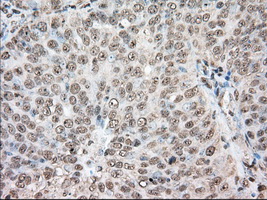
IHC of paraffin-embedded Adenocarcinoma of Human ovary tissue using anti-ACAT2 mouse monoclonal antibody. (Dilution 1:50).

IHC of paraffin-embedded Human lung tissue using anti-ACAT2 mouse monoclonal antibody. (Dilution 1:50).

IHC of paraffin-embedded Human prostate tissue using anti-ACAT2 mouse monoclonal antibody. (Dilution 1:50).

IHC of paraffin-embedded Carcinoma of Human prostate tissue using anti-ACAT2 mouse monoclonal antibody. (Dilution 1:50).

IHC of paraffin-embedded Human pancreas tissue using anti-ACAT2 mouse monoclonal antibody. (Dilution 1:50).

IHC of paraffin-embedded Human colon tissue using anti-ACAT2 mouse monoclonal antibody. (Dilution 1:50).

IHC of paraffin-embedded Human liver tissue using anti-ACAT2 mouse monoclonal antibody. (Dilution 1:50).

Anti-ACAT2 mouse monoclonal antibody immunofluorescent staining of COS7 cells transiently transfected by pCMV6-ENTRY ACAT2.

Western blot of extracts (35 ug) from 9 different cell lines by using anti-ACAT2 monoclonal antibody.

HEK293T cells were transfected with the pCMV6-ENTRY control (Left lane) or pCMV6-ENTRY ACAT2 (Right lane) cDNA for 48 hrs and lysed. Equivalent amounts of cell lysates (5 ug per lane) were separated by SDS-PAGE and immunoblotted with anti-ACAT2.

Flow cytometry of Jurkat cells, using anti-ACAT2 antibody, (Red), compared to a nonspecific negative control antibody, (Blue).

Flow cytometry of HeLa cells, using anti-ACAT2 antibody, (Red), compared to a nonspecific negative control antibody, (Blue).

HEK293T cells transfected with either overexpress plasmid (Red) or empty vector control plasmid (Blue) were immunostained by anti-ACAT2 antibody, and then analyzed by flow cytometry.












